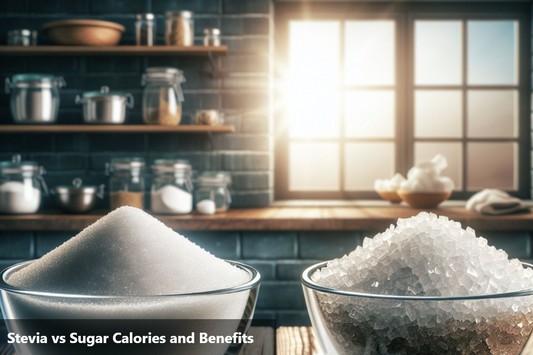The glycemic index (GI) measures how quickly carbs in food raise blood sugar. High GI foods spike blood sugar fast, while low-GI foods digest slowly, keeping blood sugar stable. Knowing food GI is crucial for managing blood sugar, particularly for diabetics or those seeking consistent energy. The GI of mango falls in the middle range, impacting blood sugar moderately. Ripe and preparation method influence mango's GI. Understanding food GI aids in choosing healthier options for blood sugar control and overall well-being.
What is the Glycemic Index of Mango?
The glycemic index (GI) of mangoes can vary depending on factors such as ripeness, variety, and serving size. Generally, mangoes have a moderate to high glycemic index, typically ranging from 41 to 60.
|
Type of Mango |
Glycemic Index (GI) Range |
|---|---|
|
Ripe Mango |
55 - 60 |
|
Unripe Mango |
41 - 50 |
It's good to know that the glycemic index is just one thing to think about when looking at how mangoes affect blood sugar levels. How much you eat and how you serve it also affect how it impacts blood sugar. Moreover, eating mangoes with protein, good fats, and foods with lots of fiber can help balance blood sugar and keep it in check. If you have diabetes or worry about your blood sugar, keep an eye on how much mango you eat and think about things such as portion size, how ripe the mango is, and what else you're eating when you have mangoes.
Research on the Glycemic Index of Mango
-
Effect of Mango on Blood Sugar:
A study in 2014 by the "Journal of Nutritional Science" looked at how fresh mangoes affect blood sugar in healthy people. They found that mangoes did not raise blood sugar levels as much as pure glucose. However, the impact varied depending on factors like ripeness and type of mango.
-
Impact of Mango Processing:
Another study in 2018 in the "Journal of Nutrition and Metabolism" compared the glycemic response to fresh mangoes and mango puree. Eating mango puree caused a higher blood sugar rise compared to eating fresh mangoes, suggesting that how mangoes are processed can influence their glycemic index. -
Mangoes and Insulin Levels:
Research from 2016 in the "Journal of Food and Nutrition Research" explored how eating mangoes affects insulin levels after a meal in overweight or obese adults. The study found that eating mangoes with a meal did not significantly increase insulin levels compared to consuming sugar. However, more research is needed to understand how mango consumption can impact insulin response and blood sugar control in people with diabetes or metabolic issues.
Tips for Incorporating Mango into a Balanced Diet
-
Fresh Mango as a Snack:
-
Enjoy fresh mango slices as a nutritious and refreshing snack between meals.
-
-
Add Mango to Smoothies:
-
Blend mango chunks with yogurt, spinach, and banana for a delicious and nutrient-rich smoothie.
-
-
Incorporate Mango into Salads:
-
Add diced mango to salads for a sweet and tangy flavor boost. Pair it with leafy greens, grilled chicken, avocado, and a light vinaigrette dressing.
-
-
Make Mango Salsa:
-
Mango Chia Pudding:
-
Make a healthy dessert or breakfast by combining diced mango with chia seeds, almond milk, and a touch of honey. Let it sit in the refrigerator overnight to thicken.
-
-
Grilled Mango:
-
Grill mango slices and serve them as a side dish or dessert. The heat caramelizes the natural sugars in the mango, enhancing its sweetness.
-
-
Mango Yogurt Parfait:
-
Layer diced mango with Greek yogurt and granola for a nutritious and satisfying parfait.
-
-
Mango Coconut Rice:
-
Cook jasmine rice with coconut milk and diced mango for a tropical twist on a classic rice dish. Serve it as a side with grilled seafood or tofu.
-
-
Mango Smoothie Bowls:
-
Create a colorful and nutritious smoothie bowl by blending frozen mango with banana and coconut water. Top it with fresh fruit, nuts, seeds, and granola for added texture and flavor.
-
Bottom Line
To sum up, knowing how mango affects blood sugar is important to control levels effectively. The glycemic index of mango shows how fast the carbs in mango can raise blood sugar. Remember, how ripe and prepared the mango is can change its glycemic index. Studying the glycemic index of mango has given us a better understanding of how it affects health. Some studies say mango has a medium glycemic index, but more research is needed because results are mixed. People with health issues, such as diabetes, should think about the glycemic index of mango when making food choices.
To keep blood sugar stable, it's a good idea to eat mango with protein or healthy fats. This can help avoid sudden spikes in blood sugar and support your overall health. For those keen to learn more, further research on the glycemic index of raw mango and its impact on various health problems could be helpful. By keeping up-to-date and choosing foods wisely, you can enhance your health and well-being.
Confused with terminologies like Low GI etc? DiabeSmart Food Products are crafted for Diabetics. They are clinically tested and have a great taste; so your food habits don't change.
This Blog post is an initiative by DiabeSmart, to provide accurate and Nutritionist / Doctor approved information related to Diabetes. DiabeSmart is India's first Food brand designed specifically for Diabetics, that has been clinically tested on Diabetics and Pre-Diabetics to deliver 55% - 70% lower Sugar spikes. DiabeSmart is part of Lo! Foods - India's leading brand for Everyday Functional Health foods.















